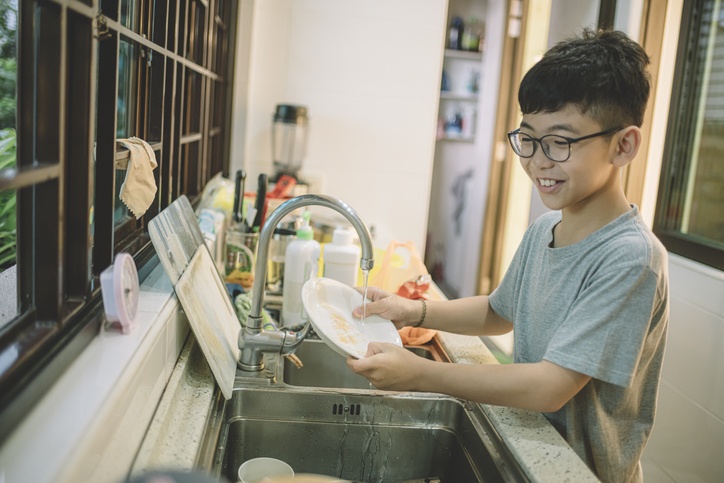Despite a global pandemic and circuit breaker measures in place severely restricting everyday activities and daily conveniences, babies are born and life does go on.
What can you read in this article?
- What to prepare for confinement
- Tips for mothers
However, with it comes with a whole range of unique challenges for the new mother during these times. When goods and services are severely restricted and largely unavailable if they do not fall under the “essential service” category.
And as confinement nannies are not considered essential, although for some this is debatable as we require the extra help. We at theAsianparent have compiled a few tips to help you figure out what to prepare for confinement, and get you through this period.

Mothers of babies born during these recent times may find it challenging trying to cope with the confinement period on their own. Photo: iStock
What to prepare for confinement
1. Rally together your forces and ask for societal support
In the absence of a confinement nanny, you will need to draw on your support system to help get you through the tiring days after you just delivered a baby.
Try to enlist the help of a family member to act on behalf of a confinement nanny and help prepare your meals for you, and help you tend to your baby.
The help of a mother, mother-in-law, or another relative or friend who could live in with you, could be vital in helping you recuperate after your childbirth experience.
The added support of someone you can lean on in the days following your delivery. For specific tasks will help keep your mind at ease and offer you much-needed opportunities to rest and recuperate.

The presence of a family member to help you in carrying out tasks will aid you in your recovery process. Photo: iStock
2. What to prepare for confinement: Plan ahead and delegate tasks
Plan well ahead for your confinement period. Prepare lists of what you may need before, during, and after your delivery period, and be prepared with anything you might need.
Lists are your friend here, and you would do well to make several lists of essential items and services you might need. So you can purchase anything well ahead of time or assign family members to help you out in getting them on your behalf.
The key to getting through confinement on your own is to think of the possible circumstances you will go through, and drawing up alternative options if Plan A does not work out.
Prepare lists for your husband or partner, helper, family members, and any of the baby’s siblings, and update them on the tasks that are expected of them. In order to facilitate the smooth functioning of your family unit. Clear communication is key.
3. What to prepare for confinement: Get help for household chores
Make sure you have communicated to whoever is helping you out well in advance. With regard to the tasks that you cannot do on your own require assistance and the expertise of others.
Letting them know ahead of what is expected of them helps pave the way for a smooth process. You could put this down in writing to enable ease of communication with whoever is helping you out.
Enlist the help of your other children, in clearing up the house and other simple household chores that they might be able to achieve. You can use timetables and chore charts to make the chores a fun, rewarding experience for your children.
READ MORE:
Postpartum Guide: Recovering from pain in stitches after delivery
Tightening vagina after delivery: 7 Ways to get back in shape down there!
Mom shocked to discover second pregnancy just three months after delivery

Get help from older siblings with household chores. Photo: iStock
4. Pay attention to your nutrition and fluid intake
Eat a balanced diet and pay attention to your nutrition. Keep your meals simple but packed full of nutrition and fiber in order to help energize you and fuel you through the day.
Avoid junk food, and instead try eating an array of vegetables, fruit, and protein in order to keep cravings at bay. Ensure that you are also getting an adequate amount of liquids. In order to help your body replenish the fluids lost in breastmilk production.
If you cannot depend on your support system to prepare your meals for you. Try preparing a few easy-to-assemble dishes, or freezer meals, ahead of your due date in order to make things easier for you to manage when the baby arrives.
Talk to your doctor if you feel you may need health supplements to aid with your diet, or for targeted issues such as increased breastmilk.
5. Maintain Personal Hygiene
This is especially important in today’s context, with the whole world being in the midst of a global pandemic. Ensure that you are always washing your hands, taking regular showers, and frequently changing your clothes and underwear, in order to prevent potential infection.
Good personal hygiene further helps prevent infection of wounds and will aid in faster healing of any episiotomies or c-section wounds.
Further ensure that any groceries or other products that come into your house are sanitised and cleaned well.
6. Don’t Stress
Do whatever it takes to maintain peace of mind. Whether it is having your husband or other family members in charge of night feeds while you get some much-needed rest, calling up and venting out your woes to a friend, or even something simple as having a nice long, warm bath while listening to some tunes in the shower.
Get adequate rest and sleep. The confinement stage is a period that you can use to your benefit to recover lost energy due to labour and childbirth.
Nap when your newborn is napping, and focus on recuperating and getting your body and mind back to the prenatal state.
You will need to turn a blind eye, on more than one occasion, to a messy house, or chores and delegated tasks not completed the way you would want them to be done. In order to catch up on your sleep or maintain a calm state of mind.
Watch out for postpartum blues and always approach a medical professional or seek help from a trusted family member or friend if you feel you are experiencing postpartum depression.
Always stay connected to your family, friends, and support system and draw on their strengths as a community to help nurture you on the path to recovery.
The most important point to note is that at the end of the day this journey is yours: What works for someone else may not always work for you.
Do make allowances for when things may not always work out the way you want it to, and take everything in its stride.
Republished with permission from theAsianparent Singapore
 Money Tips
Money Tips Building a BakuNation
Building a BakuNation Becoming a Parent
Becoming a Parent Ages & Stages
Ages & Stages Parenting
Parenting Health & Wellness
Health & Wellness Education
Education Lifestyle Section
Lifestyle Section Become a VIP
Become a VIP Press Room
Press Room TAP Recommends
TAP Recommends Shopping
Shopping Community
Community Rewards
Rewards VIP Parents
VIP Parents
